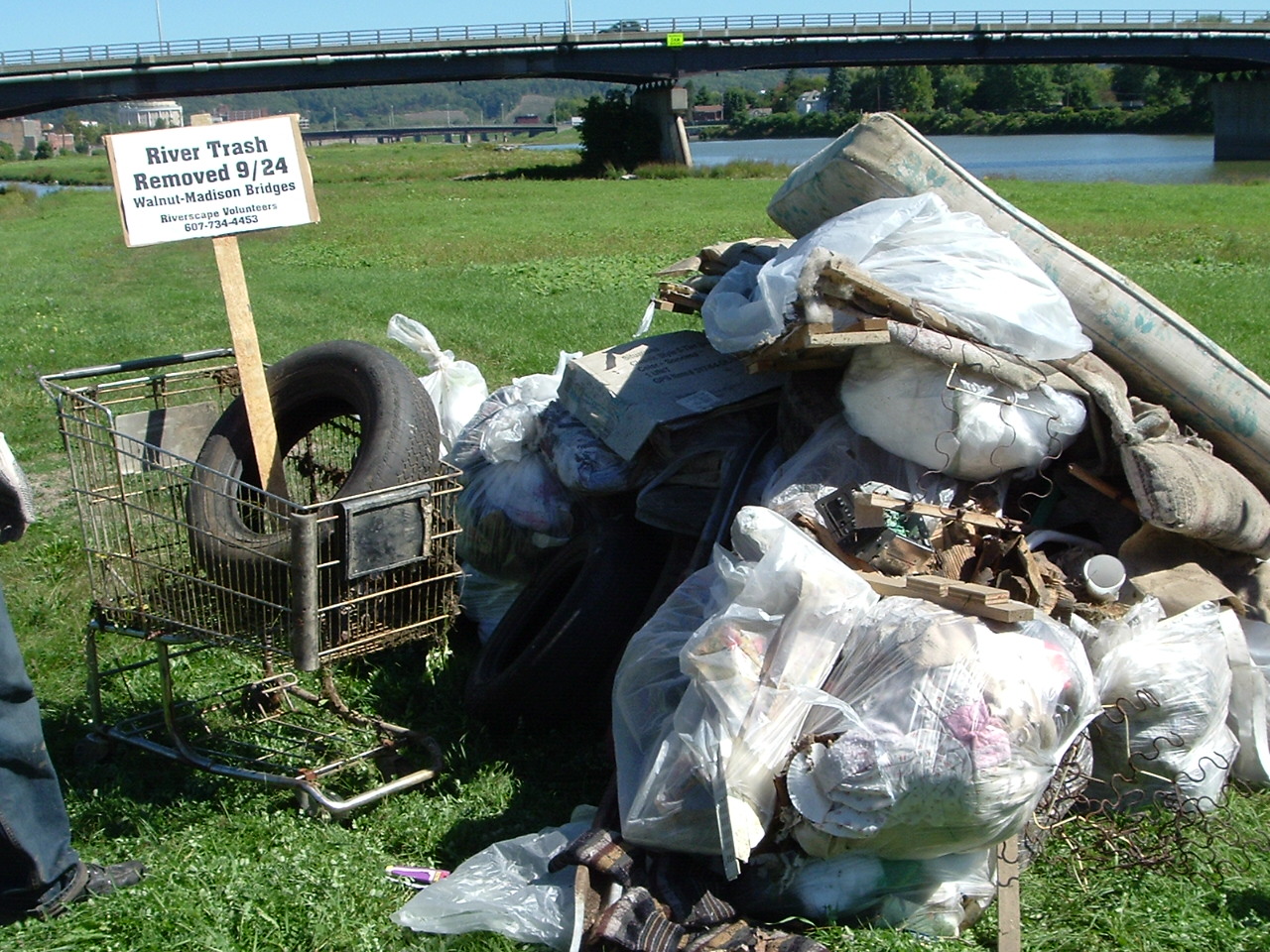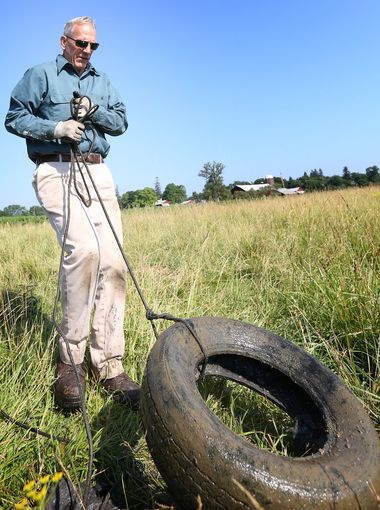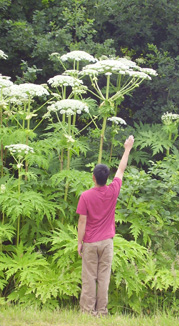
Report Suspect Dumping & Pollution
More than half of our drinking water comes from the river!

On July 8, 2020, law enforcement officials began patrolling the Chemung River trails in West Elmira in response to an increase in people illegally camping along the trails, illegal dumping and other issues.
West Elmira police, New York State Department of Environmental Conservation (DEC) conservation officers and a DEC flood control engineer will patrol the trails looking for homeless camps, dumping, trail and flood control equipment damage and other illegal activities. The patrols will be monthly and more often if needed.
“There has been a spike in the number of camps along the river and trails over the last few summers,” said Chemung River Friends co-founder, Jim Pfiffer. “Some of them are homeless camps, some are party sites for teens and others are campsite get-a-ways for local residents.”
 It is illegal to camp along the river or on river islands without the landowner’s permission. It is illegal to camp on New York State Department of Conservation flood control property. Much of the trails are on flood control land. [Pictured: Abandoned Camp on Chemung River Trail])
It is illegal to camp along the river or on river islands without the landowner’s permission. It is illegal to camp on New York State Department of Conservation flood control property. Much of the trails are on flood control land. [Pictured: Abandoned Camp on Chemung River Trail])
“When cold weather comes many of the camps are abandoned, leaving behind tents, trash, clothing, liquor bottles and other debris that River Friends or municipal officials have to clean up. Or worse, it ends up in the river, which is the source of most of our drinking water.”
The nearly three miles of narrow and hard-packed dirt trails are heavily used by people walking their dogs, jogging, cycling, fishing and enjoying nature.
“The scenic trails wind through meadows and wooded areas and offer a quick and easy way to enjoy exercise, nature and a walk with your pet,” Pfiffer said. “We are receiving increasing reports from trail users who say they are afraid to use the trails because of the camps.”
“Chemung River Friends is not opposed to the homeless or anyone camping along the river,” Pfiffer said. “But you need to do it legally and not abandon the site and leave it strewn with garbage.”
River Friends is working with local social service agencies to have an agency representative be part of the patrols to help the homeless in finding legal shelters.
The trails are also a summer hangout for teenagers who use them for partying, underage drinking and overnight camping. Often, the intoxicated teens leave the site, get in their vehicles and drive under the influence. The parties also scare away law-abiding trail users.
“Trails are like public parks,” Pfiffer said. “Individuals and families use them for outdoor recreation, nature photography, solitude, and a reconnection with nature. We want those people to feel safe and reassured that the trails are being patrolled.”
“We depend on the public to be our eyes and ears on the trails and river,” Pfiffer said. “If you see camps, suspicious activity, dumping or other illegal activities, please call 911 immediately and report it. Police want you to do that.”
Public vigilance is one of the best ways to protect our waterways and natural environments. If you see suspected illegal dumping, littering or pollution of our rivers and streams, please call and report it to authorities. Also report suspected illegal water withdrawals from waterways and motorized vehicles driving on or damaging levees and other flood control structures and devices.
Before you call, try to get as much information about the problem (time, location, vehicle license numbers, vehicle color and other details) and write it down so you can help officials resolve the problem. Do not confront or approach anyone you think is violating conservation or water laws. Instead, observe, take notes, and report.
If you see an overturned boat or paddlers on a river and they appear to be in trouble, call 911, and report the emergency immediately. Look for a sign, road, bridge or other landmark to help emergency personnel know where the emergency is taking place.
Chemung County Officer Toni Dragotta is a State DEC Conservation official and can be reached at (607) 331-7458. New York Department of Environmental Conservation officers work out of their homes and patrol the county where they live. When conservation officers are on patrol you can contact them through the Division of Law Enforcement dispatch at 1-877-457-5680.
Below is a list of agencies and phone numbers to call to report any problems, damage, or pollution to our rivers and streams:

Report River Dumping, Littering, & Poaching
Chemung County Sheriff | (607) 735-8600
Steuben County Sheriff | (607) 622-3911
New York State Department of Environmental Conservation (DEC) 24-hour Hotline to Turn in Polluters & Poachers: 1-800-TIPP DEC (1-800-847-7332).
Callers to NYDEC may file a complaint anonymously.
Report Spills
New York State Department of Environmental Conservation (DEC) Spill Hotline | 1-800-457-7362
DEC Elmira Office | (607) 732-2214
DEC Bath Office | (607) 776-2165
Report Illegal Water Withdrawal
Susquehanna River Basin Commission of Sayre, PA | (570) 731-4839.
Vehicles Damaging Flood Control Structures (e.g. Levees)
Chemung County Sheriff | (607) 735-8600
Steuben County Sheriff | (607) 622-3911
Report Giant Hogweed & Wild Parsnip
 Giant Hogweed and Wild Parsnip are invasive plant species. Giant Hogweed is very noxious and can cause severe burns and even blindness. You can find more information about these plants here. For information about how to control the spread of these plants and connect with a statewide control project, call the NY DEC Giant Hogweed Hotline at (845) 256-3111. Do not touch the plant with your bare skin!
Giant Hogweed and Wild Parsnip are invasive plant species. Giant Hogweed is very noxious and can cause severe burns and even blindness. You can find more information about these plants here. For information about how to control the spread of these plants and connect with a statewide control project, call the NY DEC Giant Hogweed Hotline at (845) 256-3111. Do not touch the plant with your bare skin!
Report Emergencies
Call 911 or your nearest law enforcement agency to report a boater or anyone in danger on the river. If possible, stay on shore and keep the victims in sight or mark a spot on shore where you last saw the people in danger. This will help emergency responders to quickly rescue those in trouble.
Remember, your eyes and ears can help protect our waterways and ensure they are clean, safe and fun to use for years to come.
Take a stand. Take action. Take responsibility.